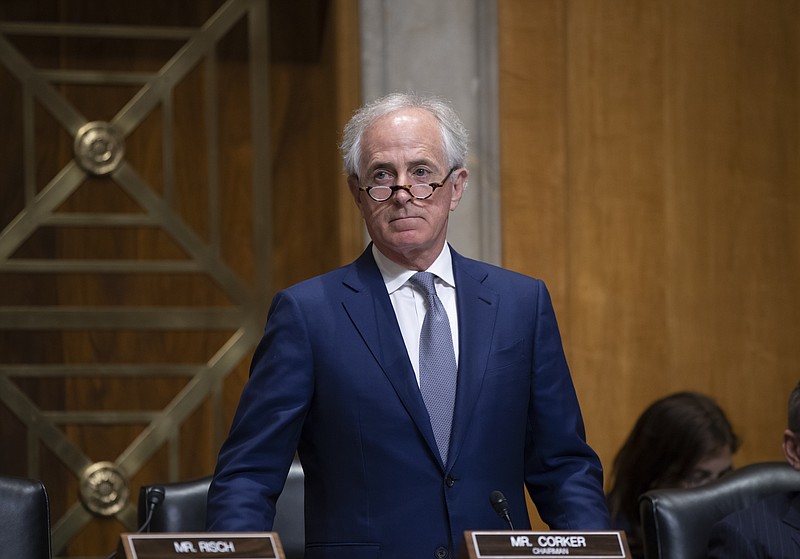NASHVILLE - U.S. Sen. Bob Corker on Thursday filed his proposal to require congressional approval for President Donald Trump's tariffs in the form of an amendment to a must-pass defense appropriation bill.
The Tennessee Republican now is "calling for an up-or-down vote on the Senate floor," Corker spokeswoman Micah Johnson said.
Corker, Sen. Lamar Alexander, R-Tenn., and a bipartisan coalition of 11 other senators worried about Trump's already-announced tariffs on steel and aluminum introduced the legislation as a bill on Wednesday. U.S. Sen. Johnny Isakson, R-Ga., is among the co-sponsors.
Trump himself called Corker on Wednesday in an unsuccessful effort to dissuade him from introducing the bill.
Corker and other lawmakers are concerned about Trump's tariffs on steel and aluminum exported by Canada, Mexico and the European Union, as well as retaliatory tariffs levied by all three against the U.S., saying they pose dangers to industrial and agricultural activity across the U.S.
The president is invoking a national security provision in the Trade Expansion Act of 1962 to slap tariffs of 25 percent on steel and 10 percent on aluminum. Critics say that shouldn't be used against America's closest trading partners and military allies.
The president is now weighing invoking the same Section 232 against Canada, Mexico and the EU on vehicle and vehicle-related parts.
Trump argues the U.S. needs fairer trade deals with those nations and he hopes to reinvigorate steel production here. It's an issue he campaigned on in Rust Belt states like Ohio that helped provide him his 2016 electoral victory. Critics say it threatens to trigger a trade war.
For Corker, Alexander and others actively opposed to Trump's approach, there is a mixture of philosophy and practicality.
Tennessee is home to three major auto assembly plants belonging to Volkswagen, Nissan and General Motors, as well as supplier factories, all of which are dependent to varying degrees on global supply chains.
The state now has more than 135,000 workers in its overall automotive industry in 917 locations, blanketing 88 of the state's 95 counties, according to the state Department of Economic and Community Development. In fact, Alexander says Tennessee may well be the No. 1 vehicle producer in the U.S.
A number of businesses, including Koch Industries, owned by the libertarian, free-trade billionaire Koch brothers, oppose Trump's tariffs, as well as various organizations, including the U.S. Chamber of Commerce, and various industry groups.
But a number of ordinarily business-friendly Republicans are worried about crossing swords publicly with Trump on the issue and hope to deploy a less confrontational approach to defuse the situation.
Senate Majority Leader Mitch McConnell, R-Ky., told Sirius XM Thursday in an interview that although he shares Corker's concerns about Trump's hardball tactics on trade with top U.S. allies, he thinks the Tennessee Republican's legislation to require congressional approval isn't the right approach.
"I don't think we need to be trying to rein in the president through legislation," McConnell said. "No. 1, it would be an exercise in futility, because he wouldn't sign it."
Corker had already made it clear that his measure would not remain a stand-alone bill and would be pushed instead as an amendment to the National Defense Authorization Act.
McConnell also told Sirius XM that he believes "the best tool for those of us concerned about this devolving into a full-scale trade war is to continue to try to convince the president that we need to not let this go on too long or go too far."
Citing unnamed senior Republicans, Politico reported Thursday that Corker's approach would run into a procedural problem with the House known as a "blue slip" issue. The U.S. Constitution requires revenue-related legislation to originate in the House before coming to the Senate, Politico reported, citing two GOP sources.
The online political website also quoted Sen. Lindsey Graham, R-S.C., who was among senators attending a Wednesday White House meeting with Trump.
While Trump did not threaten to veto the defense bill, Graham told Politico, the president did discuss with senators "how this movie is going to end" and assured them it would go well, satisfying about a dozen Republicans.
Corker and bill supporters would need 60 votes in the 100-member chamber to amend the tariffs provision into the defense bill.
Some GOP senators apparently also hope to move the debate over Corker's proposal into the Senate Finance Committee, effectively delaying it as Republicans try to change Trump's mind on trade, Politico reported.
Corker's office did not respond to Times Free Press inquiries about GOP leaders' stances and related issues.
But he told Politico that "it does hurt me a little bit to know that our institution has evolved to a place where if a president doesn't wish for something to be dealt with, we won't deal with it."
On Wednesday, Corker, a former Chattanooga mayor, said the president had called him about his legislation.
"He's obviously not pleased with this effort," said Corker, who described the conversation as "fairly lengthy." As for whether Trump was objecting to the legislation, Corker said "Oh yeah."
"It's a difference of opinion," Corker said. "He feels that this takes away his negotiating ability and this in no way takes away his negotiating ability. It's not any different from his meeting with [North Korea Leader] Kim Jong Un and - if they reach a deal - him bringing it to Congress. I've explained it's exactly the same thing."
Asked whether the conversation was "tense," Corker would only say "we had a heartfelt conversation. Finally, a lot of time had gone by, and I had other meetings."
Contact Andy Sher at asher@timesfreepress.com or 615-255-0550. Follow him on Twitter @AndySher1.
